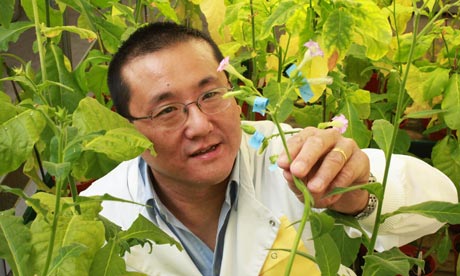I’ve been a farmer for decades–but now I’m in the process of becoming a pharmer.
On the surface, there isn’t much difference between the two. Both live primarily in rural America and grow crops. But where farmers want to feed the world, pharmers hope to heal it.
My brother Joe and I are involved in an ambitious project to grow corn that will help people afflicted by cystic fibrosis. The clinical tests are still underway, but we believe our product will help 30,000 people find relief from painful digestive disorders within three years, and more in the future.
This may sound like science fiction, but it’s quickly becoming science fact. Before long, pharming may help treat diabetes and cancer patients and also produce vaccines. I’m a former Marine, and one of my fondest hopes is that the Department of Defense will work with pharmers to produce an anthrax vaccine from corn–perhaps before another terrorist launches a new killing spree against American citizens.
Organic chemists currently produce most of the drugs prescribed by doctors, and they do it synthetically. Drug companies in search of new and specialized medical treatments, तथापि, look increasingly to proteins, which can’t be manufactured by traditional methods. They need to be grown–and one of the most attractive methods for growing them is in corn. This staple crop of the American heartland is much more receptive than other plants to genetic manipulation, and it may very well become the main vehicle through which the pharmaceutical industry develops the next generation of wonder drugs.
Agricultural biotechnology is not without its detractors–usually activists who don’t understand basic science or appreciate the enormous potential of genetically modified crops. The prospect that innovative strains of corn might be used not only to increase yield and resist disease but also to treat some of the worst diseases afflicting mankind has caused at least one person in their ranks the rethink his beliefs. “I have concerns about genetic engineering,” said Paul Gilding, former executive director of Greenpeace International, in an interview with Top Producer. “But genetically engineered crops to treat cancer would be a maximum societal benefit.”
Who could argue with that? Farmers already alleviate incredible amounts of human suffering simply by growing crops that provide nourishment to hungry people. Imagine if pharmers could join them by growing crops that offer treatment to sick ones.
This is welcome news for everybody everywhere–and it’s especially welcome news for agricultural communities in rural America, which will experience the economic benefits of the biotech revolution firsthand. Pharming promises to free these regions from the problem of low commodity prices and the trap of government subsidies. What’s more, high-tech companies will locate many of their offices and plants near the pharms in the cornbelt and anywhere people are willing to experiment with cropland to create a new generation of pharmaceutical products. On a fundamental level, that means jobs in areas that haven’t seen as much growth as other parts of the country in recent years.
Like many farmers, my brother and I have experimented with crops over the years. We’ve grown waxy corn that goes into salad dressing and soybeans for Japanese consumers. But we’ve never been so excited as we are now about the potential good that may come from our harvest.
I’m not exaggerating when I say that the oncoming biotech revolution is going to be much bigger than the information revolution we’ve seen in Silicon Valley–an enormously important event that is changing our world. We’re on the threshold of improving quality of life all around the planet, with the only limits coming from our own imagination and willingness to seize scientific opportunities.
Bill Horan farms with his brother Joe near Rockwell City, IA and serves on the Board of Directors for Truth About Trade and Technology. ऊपर 50% of the crops grown on this NW Iowa farm are produced under contract for various end-users.

